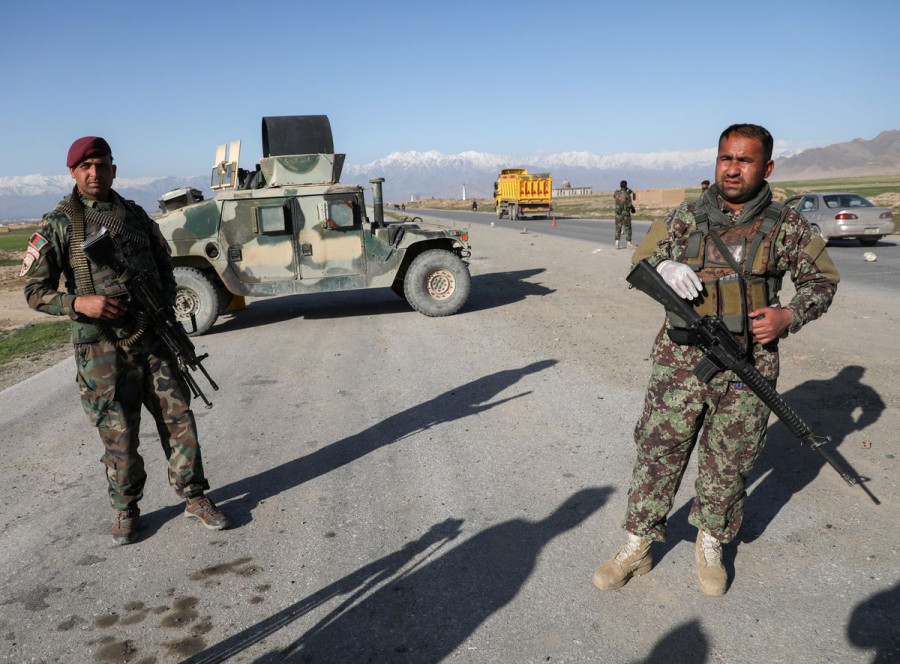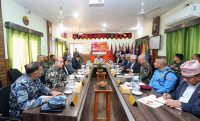National
Nepal must be watchful of the geopolitical fallout of US Afghan pullout, analysts say
Kathmandu has no direct stake but regional powers and neighbouring countries have stepped up engagements amid fears of Taliban takeover of the war-torn country.
Anil Giri
The United States’ announcement to withdraw all its troops by September 11, after two decades of military presence, could trigger a geopolitical flux in the region, and observers say some impact on Nepal cannot be ruled out.
Major powers and key stakeholders like the United States, Russia, China, India, Pakistan and Iran, among others, are weighing likely scenarios in the country, as fears of the Taliban taking over loom large. Reports suggest the Taliban of late have rapidly expanded their territorial control closing in on Kabul, the capital.
Foreign policy experts and observers say pulling out the American troops from Afghanistan and a possible takeover by the Taliban would hamper regional peace and security.
Arjun Kant Mainali, a former joint secretary at the Foreign Ministry, said Afghanistan is headed towards a power vacuum, which will have a huge impact in the region, thereby Nepal seeing some ripple effects.
None of Afghanistan’s neighbours will benefit from a Taliban takeover, and with New Delhi having its diplomatic stakes—along with massive investments—the United States, according to Mainali, could encourage India, with which Nepal shares an 1,800-km-long open border, to engage with Afghanistan.
A possible triumph of the Taliban would threaten Indian investments worth billions in various sectors, including dams, roads and other infrastructure. How South Asia’s biggest country engages with Afghanistan and its outcomes are likely to have a profound impact on the region. Pakistan, Afghanistan’s next door neighbour, too is weighing its options, and Islamabad too is likely to make its moves to put New Delhi in check with the backing of China, which has its own rivalry with India and an interest in Afghanistan. Beijing, through its Belt and Road Initiative, aims to enhance its economic and diplomatic influence. The Chinese investment so far has failed to pick up pace largely due to the constant instability and American presence in Afghanistan. But these two key aspects are going to change in less than two months from now.
A senior Foreign Ministry official told the Post that the ministry has been closely following the developments in Afghanistan and possible repercussions in Nepal in the aftermath of the US pullout.
An immediate impact would be loss of jobs for Nepali nationals working in Afghanistan. The number of Nepalis working in Afghanistan is estimated to be around 100. Their safety would be a primary concern and most probably they would return home in the event of a Taliban takeover.
The Foreign Ministry official said what is more concerning is a threat to regional peace and security, which could result in displacement of Afghans.
“Already, we are hosting some refugees from Afghanistan and the number could rise because our immigration and vetting systems are poor and weak,” said the official.
According to the UN refugee agency in Kathmandu, Nepal is currently hosting around 50 Afghan refugees in Kathmandu. They come under the category of “urban refugees”.
If the peace talks falter or fail altogether, it could hamper relations between Washington and Islamabad. Instability or Taliban gains in Afghanistan could embolden militants in Pakistan, thereby threatening regional peace.
“What is happening in Afghanistan and how situations will unfold, especially after the US pullout, will have a larger impact on the ties between India and Pakistan as well as India and China. A possible spillover effect in Nepal cannot be ignored,” said Ramesh Nath Pandey, a former foreign minister.
“As SAARC chair, Nepal needs to constantly raise its voice—and make it heard—at the regional level about the threats to regional peace and security from instability in Afghanistan.”
But the only platform where Nepal has some wherewithal to exert influence is in a moribund state, largely because of India-Pakistan rivalry.
Afghanistan joined SAARC in 2007 as its eighth member. SAARC itself is struggling to take its process forward and hold its 19th summit ever since India pulled out in 2016, charging Pakistan with attacking its military base in Uri in Jammu and Kashmir.
As the SAARC chair, Nepal can make a broader call for maintaining regional peace, but the bloc’s charter won’t allow any specific discussion on any specific country’s matters or issues concerning two or more countries.
Arjun Bahadur Thapa, former secretary general of SAARC, however, ruled out any possibility of discussing Afghanistan and the unfolding situation at the regional bloc’s platform.
“There is no record of member states discussing internal matters of any country,” Thapa told the Post. “Even if Nepal, as the SAARC chair, takes any initiative, a response is far-fetched.”
Experts and observers say even though there are concerns about regional peace and security coming under threat after the US pullout from Afghanistan, much depends on how individual countries engage each other and the regime in Kabul.
According to Pandey, both India and China, Nepal’s immediate neighbours, have high stakes in Afghanistan, and Kathmandu needs to monitor closely how they engage Kabul and its forthcoming government.
Thapa, the former secretary general of SAARC, said countries like India, China and Pakistan that have high stakes in Afghanistan are working bilaterally or individually.
“But one thing is sure, if there is any instability in Afghanistan, it will definitely hamper regional peace and security,” he said. “For China, further instability could affect its own investment plans. With Americans set to pull out, Beijing is likely to step up its engagement in Kabul. So will India. A geopolitical flux is just on the cards.”
With Washington more likely to outsource its Afghan policy to Delhi after the pullout, some analysts say there are chances the Biden administration could start seeing Central Asia, including Nepal, through India’s prism.
“By extension, Washington could outsource its policy from India on the region and Nepal,” Mainali, the former joint secretary, told the Post. “It is almost certain that the Taliban are going to take over Afghanistan but we do not know what next.”
But some foreign policy experts say the US pullout from Afghanistan and its aftermath may prompt some quick geopolitical shifts and reengagements but not much of an impact on Nepal.
“The disengagement policy of the Department of State is the by-product of liberal foreign policy of the Oval Office, so probably it may not affect us directly,” said Khadga KC, a professor of International Relations at the Tribhuvan University. “Much will depend on the visible engagement of the Oval Office with New Delhi. India will carve out its own policy for Afghanistan to countervail China. In the geopolitical games, the US may find a way to re-engage in Afghanistan to create a balance of power.”




 22.45°C Kathmandu
22.45°C Kathmandu














